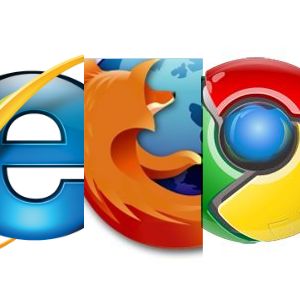Computer security is an important matter for any business. Slow and infected PCs lead to lost productivity, down time and even lost business.
 In recent years antivirus software has proven to be increasingly ineffective in stopping new malware threats. This means that blocking the entry points for bad software is more critical. Web browsers are often the entry point for malware and viruses, so your choice of default web browser on your business PCs is important.
In recent years antivirus software has proven to be increasingly ineffective in stopping new malware threats. This means that blocking the entry points for bad software is more critical. Web browsers are often the entry point for malware and viruses, so your choice of default web browser on your business PCs is important.
Unpatched security holes in your web browser can allow unscrupulous websites to install unwanted software just by visiting, without any sort of warning or clicking required.
The most important considerations in choosing a default web browser for your company include the browser’s built in security features and the speed at which security problems are fixed once discovered.
Frequent updates are essential because history has shown that even the most secure software is eventually hacked. Updates for internet-based applications often include some sort of security fixes. If your business computers are running out-of date software, the risk of infection goes up.
Internet Explorer
Internet Explorer is the default web browser on most PCs. Since it’s the most widely used, it’s also the most frequent target of malware.
In years past Internet Explorer had a terrible security record, especially with version 6, which is widely considered the least secure software ever due to its insecure design and long list of unpatched vulnerabilities. It is still used by almost a small percentage of businesses and still features many unpatched security holes.
With subsequent versions, however, security problems improved. As of version 9 IE has a much better security record, along with popup blocking, protection against phishing attacks and increased control over third-party plugins and toolbars.
IE is updated along with Windows via Windows Update. If updates are set to automatic (highly recommended) then IE will be kept up-to-date and is generally safe to use. It is also worth noting that some older websites require IE to work properly, although that is increasingly rare.
Mozilla Firefox
In the days of the super-terrible IE6, Firefox was the answer. You could finally browse websites without being constantly infected, and it was faster and more stable.
Firefox is still a safe and speedy browser, but it is lagging behind in ease of updating. It requires administrative permissions to install and update. This may be a problem if your business includes several PCs. Who will be in charge of updating all those copies of Firefox? The reality in this type of situation is that manual updates are rarely done.
Google Chrome
Chrome is a newer web browser that has many appealing features. It is generally faster than other web browsers, and has an excellent security record. Its best security feature is the way it uses ‘sandboxing’ to keep web activity separated from the workings of the rest of your operating system, and is a big obstacle for malicious websites to overcome.
Chrome also features a silent updater that installs updates as they become available without prompting the user. This means that Chrome will keep itself up to date, which is ideal for most small businesses. Chrome generally has less security flaws than other browsers, and they are usually patched within days or even hours of discovery.
Also worth noting is Chrome’s built in support for Flash player and viewing PDFs from the browser itself, two less add-ons to worry about.
Others
The Opera web browser also has a good security record, an option for automatic updates, and fast performance.
Safari handles updates through Apple Software Update, which requires your attention and administrator access for each update. Safari has a reasonably good security record on PCs.
